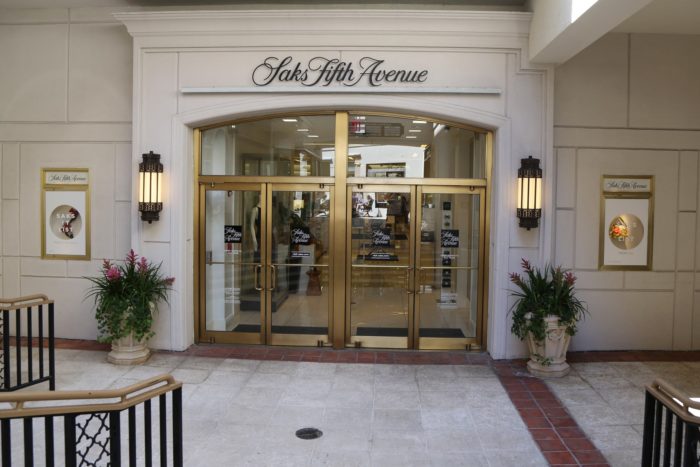Top Class Actions’s website and social media posts use affiliate links. If you make a purchase using such links, we may receive a commission, but it will not result in any additional charges to you. Please review our Affiliate Link Disclosure for more information.
A class action lawsuit has been filed against Saks Inc. by an employee claiming the company created “no hire agreements” with other luxury fashion retailers.
The other defendants in this action include Louis Vuitton, Fendi, Loro Piana, Gucci, Prada, and Brunello Cucinelli, who are concessionaires of Saks who operate “stores within stores” at various Saks locations nationwide.
These companies rent space from Saks and operate independently by hiring their own staff and making inventory determinations, according to the Saks class action lawsuit.
Plaintiff Anja Beachum claims that Saks entered into “no hire agreements” with each of the concessionaires so that the stores do not hire each other’s employees.
The Saks class action maintains that the “no hire agreements” are intended to reduce mobility between concessionaires and thereby suppress employee compensation to levels lower than what they would get in a free marketplace.
The defendants conspiracy to fix and suppress wages is in violation of the Sherman Act, the Saks class action lawsuit states.
Beachum claims that selling luxury goods requires extensive training and that the defendants invest in training their employees because the salespeople are an important cog in the store’s ability to sell their products.
Consumers expect the salespeople to be knowledgeable about the products that are sold at the concessionaires, according to the plaintiff.
In addition, the defendants reportedly expect their salespeople to maintain frequent contact with customers in order to build up a rapport with them. Salespeople have business cards, which in turn encourages the customers to return to the concessionaires to purchase more items, says Beachum.
The plaintiff maintains that in a functioning and lawful labor market, each defendant would compete with the others by soliciting each others’ employees and/or accepting applications from employees that are currently employed by another defendant.
The Saks class action lawsuit says, “A properly functioning market would involve prospective employers freely communicating with prospective employees—even if the employee does not first express interest—and employees communicating intra-store and at other stores owned by their employer or another Defendant about wages and employment opportunities.”
The plaintiff says that “no hire agreements” between the defendants have a significant impact on employee compensation and benefits as well as other conditions of employment.
As an example, if one of the defendants would like to hire an employee from another one of the defendants, they could solicit them and agree to pay them a higher salary, says Beachum.
She says even if the employee does not want to change companies, they could negotiate with their current employer for a higher salary.

The Saks class action lawsuit says that each of the defendants entered into the no hire agreements with knowledge of the other defendants participation with the intent of reducing the plaintiff’s mobility, reducing competition for skilled labor in the concessionaires, as well as suppress compensation.
“Defendants’ No-Hire Agreements unduly restrict lateral hiring of Luxury Retail Employees when employees actually attempt to switch employers, by dissuading Luxury Retail Employees from even applying to switch in the first place, and by preventing practices like cold calling that prevail in properly functioning competitive markets,” the Saks class action lawsuit maintains.
Beachum says that luxury retail employees seek to switch between luxury retailers in order to obtain increased compensation and benefits. To be sure, the plaintiff and other potential Class Members have attempted to switch from one concession to another in order to obtain a higher salary. The plaintiff says that these attempts have been unsuccessful.
Prospective Class Members include: “All individuals in the United States and its territories that were employed by at least one of the Defendants at any time during the period of Sept. 30, 2015 through and until the anticompetitive effects of Defendants’ conduct ceases who: (i) work in any of Defendants’ respective stores and/or boutiques; and (ii) sell and/or manage the sale of luxury goods to consumers.”
Do you work at a concessionaire at Saks? Leave a message in the comments section below.
The plaintiff is represented by John D. Radice of Radice Law Firm PC, Eric L. Cramer, Sarah Schalman-Bergen, Patrick F. Madden, Michaela Wallin, and Daniel J. Walker of Berger Montague PC and Michael K. Yarnoff of the Kehoe Law Firm PC.
The Saks No Hire Antitrust Class Action Lawsuit is Anja Beachum v. Saks Incorporated, et al., Case No. 1:20-cv-01769, in the U.S. District Court for the Eastern District of New York.
ATTORNEY ADVERTISING
Top Class Actions is a Proud Member of the American Bar Association
LEGAL INFORMATION IS NOT LEGAL ADVICE
Top Class Actions Legal Statement
©2008 – 2024 Top Class Actions® LLC
Various Trademarks held by their respective owners
This website is not intended for viewing or usage by European Union citizens.
















2 thoughts onSaks Class Action Claims Corrupt No-Hire Agreements
Can you please add me
Add me